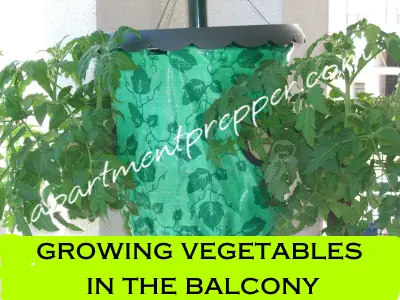This post is by Bernie Carr, apartmentprepper.com
To become more self sufficient, a common piece of advice is to grow your own vegetables. Ideally, you would have a nice sized backyard to start your garden, but apartment dwellers have very limited space. So we decided to try growing some vegetables in the balcony. I don’t have a lot of plants: just a few tomatoes, peppers, mint, rosemary, basil, green onions, parsley and cilantro.
Here are some ideas to get started:
- Check apartment rules regarding growing plants in the balcony or porch. Our building has no restrictions regarding plants in the balconey, so we were all set.
- Container gardening is the best way to grow vegetables in a limited space. I bought wire boxes that can hang from the balcony, plastic containers that fit in them, as well as large pots, and filled them with Miracle Grow soil. Since I am new at this, I need all the help I can get! I planted the tomatoes in a hanging Topsy Turvy planter that I got as gift. I may also start a few more vegetables cheaply in five gallon buckets.
- Starting plants from seed is cheap, but will take longer to see results. As a beginning gardener, I chose to buy live tomato and pepper plants from the garden center, but started herbs from organic seeds purchased at the same time. Herbs grow quickly. It is a great feeling to see those little shoots growing out of the soil. Some good choices include tomatoes, peppers, zucchini, herbs that you like to use such as mint, oregano, rosemary, chives. Here is a quick tip about green onions: do not throw out the roots that come with the green tops, stick them in water or soil and they will grow fresh shoots, you won’t have to buy it again for a while.
- Read the instructions that come with the plant or seed packet, and research your chosen plants in the internet.
- Save on water usage by collecting water that usually gets wasted, such as the cold water from the shower as you’re waiting for it to warm up, water used to wash vegetables and fruit, water used to boil eggs, etc. So far my water bill has not increased in the month that I have had the garden.
- Water only when one inch of soil has dried out. Then give the plants a deep watering. Depending on your climate, you may need to water every other day or every three days.
- Once the herbs have grown a few inches, pinch the tops to encourage growth. After only a couple of weeks, my herbs started getting sturdier, I was able to give some away to friends.
- Protect your plants from birds and pests. My husband and I were arguing about how to protect my new tomatoes from getting pecked by birds. I was watering the plants, and got excited when I saw these little baby tomatoes peeking out; then I spotted a bird building a nest over the balcony next door. I think covering the plants with a makeshift net made of pantyhose or something similar would work, but he thinks it’ll look weird and the neighbors will report us for having unsightly things flapping in the breeze. We opted for a plastic net from the garden section of Lowe’s and that seemed to do the trick without being unsightly. The plants were protected for the rest of the growing season.
I used to think you needed a large backyard to plant a vegetable garden, but now that I have tried it, a small space will do just as well.
Updated from a previous post that was originally published on 5/10/2010.


Awesome ideas!! Don’t forget to grow potatoes . . . super easy. Couple inches of dirt in a large pot. Put in potatoes eyes. Cover with dirt and water. Every time you see a few inches of vines and leaves, cover with a bit more dirt. Works well for me.
Hi Karen, Thanks for the reminder – potatoes are great to grow!